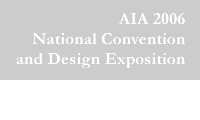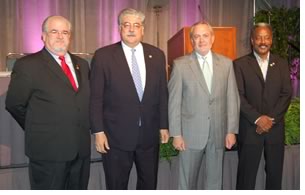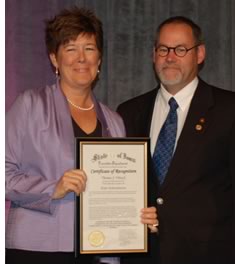

6/2006
Resolution passes for study of AIA electronic documents use by small firms

 After
an introduction on the morning of June 10 to the newly elected officers
of the AIA—2008
President Marshall Purnell, FAIA; Vice Presidents George Miller, FAIA,
and Mike Rodriguez, AIA; and Secretary David Proffitt, AIA—the
delegates to the AIA National Convention in Los Angeles voted affirmatively
on two Bylaws Amendments and a Resolution proposing a study of the
use of AIA electronic documents by small firms and sole practitioners.
After
an introduction on the morning of June 10 to the newly elected officers
of the AIA—2008
President Marshall Purnell, FAIA; Vice Presidents George Miller, FAIA,
and Mike Rodriguez, AIA; and Secretary David Proffitt, AIA—the
delegates to the AIA National Convention in Los Angeles voted affirmatively
on two Bylaws Amendments and a Resolution proposing a study of the
use of AIA electronic documents by small firms and sole practitioners.
Bylaws Amendment 06-A “Board Membership for Associate and CACE Representatives to the Executive Committee” was adopted by the two-thirds majority vote required. The Associate and Council of Architectural Component Executives (or CACE) representatives to the Executive Committee attend all Board meetings, where they share their expertise. This amendment addressed whether—for equitable reasons and to help ensure a full voice on the Board for their respective constituencies—they should be able to vote on the Board until their service on the Executive Committee has concluded. The amendment, which was sponsored by the Board of Directors, revises the Bylaws to make both the Associate and CACE Representatives to the Executive Committee full voting members on the AIA Board of Directors throughout their period of service on the Executive Committee.
Associate reps on the Board and Executive Committee can now vote on member dues: Delegates also voted to adopt Bylaws Amendment 06-B, “Voting Rights of Associate Director and Associate Representative to the Executive Committee Regarding Architect Member Dues.” The Institute’s Bylaws provide that “Associates and International Associates may not vote on dues for Architect members.” The evident purpose of this provision was to ensure that only Architect members will have the right to vote on dues changes affecting their category of membership. It had an apparently unanticipated consequence—it prevented the Institute’s Associate Director from voting (as a Board member) on Board actions and (as a delegate-at-large) on convention actions that have to do with Architect dues. It similarly restricted the Associate representative to the Executive Committee from voting on Architect member dues in actions before that body. Because neither of these positions existed at the time the relevant Bylaws language was adopted, there seemed no reason to think that adoption of the language was meant to cause this result. The amendment adopted by the delegates at convention eliminated the pertinent restrictions on the Associate representatives to the Board of Directors and the Executive Committee with respect to voting on dues for Architect members.
Resolution on electronic docs for small firms and sole practitioners passes: Sponsor AIA East Bay also put forth Resolution 06-1, “Full Function Electronic Documents for All Firms, Small and Large,” designed to ask for a study on the use of AIA electronic documents by small firms and sole practitioners. The AIA Board took no position on this resolution.
Work has been underway since early 2005 within the Institute to determine options to best serve members— small firms, small project practitioners, and sole practitioners.
Recognition and appreciation
As is traditional, delegates also voted to recognize newly licensed members;
departing members of the Council of Architectural Component Executives
Ken Englund of AIA Indiana and the Ohio Valley Region, Barbara Rodriguez
of AIA New York State, and Alice Sinkovich of AIA Chicago; and retiring
Executive Committee and Board members. They also voted by acclamation
to extend appreciation to the host chapter; convention committees;
exhibitors; and AIA President Kate Schwennsen, FAIA, and her husband,
Barry Jones, AIA.
 A note of special appreciation
A note of special appreciation
AIA Vice President Michael Broshar, AIA, brought a special Certificate
of Recognition for AIA President Kate Schwennsen, FAIA, from Iowa Governor
Thomas J. Vilsack. It said:
“Kate Schwennsen has made signal contributions to the life of her community and the State of Iowa. She has taken the values nurtured by the State to both a national and international stage.
“At home, she has added to her community’s design legacy with her work; educated and mentored generations of students who will enrich the State and the nation with their gifts; been a role model for Iowa’s women; and has led her fellow Iowa architects to a creative engagement with the 21st century.
“Abroad, she has taken her love for the land on which she grew up and translated it into a passion for sustainability. She has been a champion of diversity and inclusiveness so that the architecture profession might mirror the society it serves. She has demonstrated that although Iowa may be America’s heartland, it has a global vision. She has applied well what she has learned in the classroom and her work—an inspirational quality of compassion and caring that reflect well on the values of her birthplace and identify her not only as a national leader of the 77,000-member American Institute of Architects, but as a global ambassador for everything positive about the State.
“On behalf of the Citizens of Iowa, I congratulate you for your personal commitment and thank you for your unwavering support.”
Delegates honored Schwennsen with a standing ovation.
Copyright 2006 The American Institute of Architects.
All rights reserved. Home Page ![]()
![]()
![]()